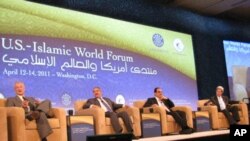U.S.-based experts on the Middle East are closely watching the popular uprisings in parts of the Arab world and discussing how Washington can best respond to the turmoil. U.S. policymakers are trying to support democracy, but also worry about mounting instability in the region.
For decades, Washington has considered the Middle East a region of vital U.S. interest, in part because it sits atop the world’s largest reserves of oil and natural gas. And for the U.S. to maintain its strategic influence in the region, regional experts say Washington has often relied on friendly Arab governments that suppressed the democratic aspirations of their people.
But now, with popular uprisings sweeping through the area, U.S. policymakers are looking at other ways Washington can stay relevant in the region. Secretary of State Hillary Clinton made that point at a recent meeting of the U.S.-Islamic World Forum in Washington.
"Wherever we can, we will accelerate our work to develop stronger bonds with the people themselves - with civil society, business leaders, religious communities, women and minorities. We are re-thinking the way we do business on the ground, with citizens themselves helping set the priorities," she said.
One-size doesn't fit all
Even so, Clinton went on to say that the U.S. response to Arab democracy movements would vary from country to country, according to conditions on the ground and U.S. strategic interests.
Watch Secretary of State Hillary Clinton's remarks to the U.S.-Islamic World Forum:
Former Assistant Secretary of State Martin Indyk was at the forum as well and agreed with that approach.
"When the people of Egypt revolted against the pharaoh [former president Hosni Mubarak], we, I think, made the right decision in terms of getting to the right side of history in supporting peoples’ aspirations for the values the U.S. supports," he said.
But according to Indyk, that approach might not be appropriate for a country like Saudi Arabia.
"For Saudi Arabia, it is a lot more complicated because instability in Saudi Arabia can drive the price of oil through the roof and can dramatically affect the global economic recovery and our own economic recovery," he said.
New understandings necessary
Indyk says Washington now needs to reach new understandings with Saudi Arabia and other Gulf nations so they can move forward toward political and constitutional reforms while avoiding the revolutionary uprisings like the ones that rocked Egypt and Tunisia.
Former U.S. National Security Advisor Zbigniew Brzezinski says one way Washington can improve its standing and influence in the region is by leading a renewed effort to reach peace between Israelis and Palestinians. But he warns that such an effort could backfire if it failed to show results.
"If the U.S. persists in verbal initiatives which are very promising and a complete lack of subsequent strategic implementation of the verbal initiatives, we are going to be in big trouble in the region and that is a fact of life," said Brzezinski.
But for Brzezinski and other regional experts, the main thrust of U.S. diplomacy in the Middle East should be toward strengthening the region’s pro-democracy movements.
One of those experts is Shibley Telhami of the University of Maryland. Telhami says a public opinion poll sponsored this month by the university’s Program on International Policy Attitudes indicates a solid majority of Americans - 57 percent - favor U.S. support for increased democracy in the Arab world.
"The largest segment of Americans think that the demonstrations in the Arab world are not, in the first place, about Islamists," said Telhami. "They are about ordinary people seeking freedom and democracy. And that belief leads them to be somewhat optimistic and somewhat supportive of Arab democracy, and so when you ask them should the U.S. support the emerging democracies even if their governments are less friendly to the U.S., you have a majority say yes."
As Telhami and the other Middle East experts emphasized, if Washington can align itself with the people of the region instead of repressive governments, it can strengthen the resistance to radicalism and terrorism.





